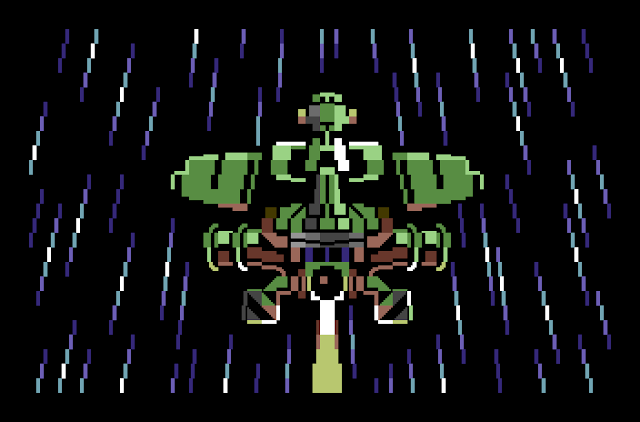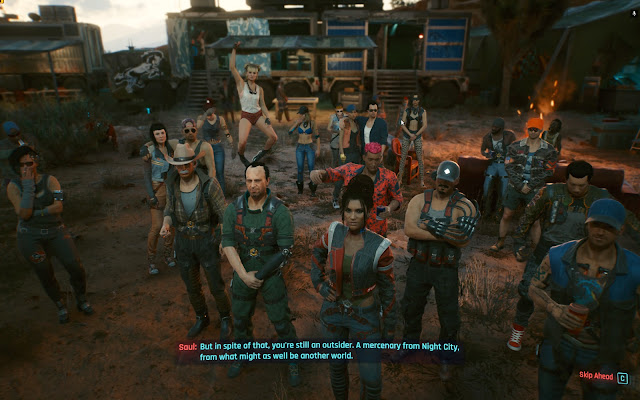Ok, the usual year recap thingy, biased towards the retro/c64/scifi side of things.
Retro things and machines
I've been strangely worried about being less "productive" when it comes to things like PETSCII or bitmap graphics. But all in all I did quite a lot of other things. For example, I released the C64 game Leilei Relay, even if this was mostly coded in 2020.
 |
| Goodbye 2021 |
The working title was Uranus Lander (cf. Jupiter Lander), and I really did intend to make a PETSCII one-screener out of it.
Then I got into vertical scrolling, character graphics, smooth sprite animation... This way the project grew in size.
 |
| Hyperspace PETSCII |
With re_monument, I did go public with the first "demo-something" intended for more modern computers. This was outed at the Vammala Party. The code was originally p5.js browser-friendly, but eventually put into Processing/Java to get the music working more easily. The music was put together with my weird MIDI-setup and the software I may eventually open up more.
 |
| Frame from re_monument |
Also, I put a lot of attention on Amiga and Raspberry Pi at the first half of 2021, but stopped working on that. I'll see if I can pick up some of the things next year.
Electric kickbikes (or "scooters") became a new blog theme, first starting with the Voi rentals and eventually getting my own. It's one idea for steering my mind away from sitting in front of a computer both at work and at home. Sadly the weather's not currently very good for riding.
Games
It looks I got to play a lot of games though.
2020 was the year of Steam/Proton, but this year I've also added Geforce Now streaming service to my arsenal. With some luck, it's possible to collect games to Steam and Epic and stream them using this service, without having to use your own hard disk space for installing.
Recently I played through last year's Cyberpunk 2077. Despite all the bloated early hype, it's a decent fairly linear story-driven game. Many in-game technologies that looked like dynamic gameplay elements in the trailers are more like skin. Granted, it might reward more in-depth play and optimizing the character's cyber implants.
Having said that, the hacking elements are rather nicely done and do not distract too much from the other gameplay. Still, it looked the fastest way to play through was to emphasize gun skills and damage hacks, then shoot everything to pieces.
 |
| Spot the glitch. |
Plague Tale: Innocence was on the table too, but had to give up halfway because of stressful gameplay. Likewise Shadow of the Tomb Raider was eventually (digitally) shelved. These games are not duds but simply did not click with me now. Reventure took a surprising 16-hour chunk to play "through".
I also got round to playing Fortnite, only to find it's not that inspiring to sneak around for 20 minutes and then end up killed by the first person you meet. Somehow surviv.io had already shown a better format to me. I can still understand the appeal of the game.
Talking of surviv.io, I might have continued playing, but the numerous problems with logging in, and apparent disregard for the browser version began to demotivate me. Not that many play it currently, it seems.
Proton has continued to be useful. I had quite an educational streak of fps games with the remastered Quake, Black Mesa (Half-Life 1 remake), Halo: Master Chief Collection, and replaying Half-Life 2 once again.
Chess is still on the playlist, but the lessened playtime begins to show in the ratings. It may also be the average opponent at Lichess has become better, what with the surge in popularity of chess in general. But in any case, a vicious circle of not playing may be complete as it's not fun to see the rating drop. Yet, if the only remaining motive to play is the rating, then it may be worth reconsidering whether to continue playing at all. I'll still give it a chance when a suitable moment comes.
Sci-fi, films, TV, books
Instead of a full season there was a Doctor Who 6-parter called Flux. On one hand it was a bold experiment with disjointed story-telling, but on other hand it also suffered from the format, cramming in ideas that would have been more suitable for a full season arc.
The show has been best when the stories have been more muted and given some time to build-up, so of course everything had to be extremely amped-up, spliced and shifting gears rapidly.
 |
| One of the Ravagers. Like, Ravages of Time. Geddit? Sigh. |
Sure, Doctor saves the Earth and the Universe routinely in the season finales, an in-joke at this point, but now everything was hoovered back to the good old status quo in the most rapid and CGI-laden way possible. Plus a couple of genocides here and there.
Ok, it was actually unclear what's the state of the universe(s) now. We'll see. There's a couple of specials to come, but rumours also abound of cancelling or switching ownership of the whole series.
Sisyphus: The Myth, was initially promising but a very un-even time travel scifi show. Lost in Space ended in a decent way, but it never quite captured the concept of the original, of, you know, actually being "lost in space". Except maybe as the final punchline of the final episode. The not so great Another Life also ended, improving somewhat from the first season.
Lucifer has not that much to do with Neil Gaiman's world from which it originates, but it has been a fun and competently done series. Likewise Dirk Gently's Holistic Detective Agency americanized the original concept a lot but was still nice while it lasted.
 |
| The 1990s mapped: as internet became widespread, Gibson had to follow |
As for books, the most important was Liu Cixin and the trilogy of The Three-Body Problem, The Dark Forest and Death's End. (Curiously, the Finnish version of Death's End would be "Death is Eternal") It's a somewhat "post-modern" take on classic science fiction, and despite being "non-western" it's very aware of Clarke, Asimov and the like. Although working in this classical hard science fiction frame, it is comparatively pessimistic and to extent even nihilistic.
I read William Gibson's sprawl trilogy in very early 1990s, but have not really paid much attention to his later works. Now I've been going through the 1990s "bridge trilogy" of Virtual Light, Idoru and All Tomorrow's Parties.
No comments:
Post a Comment